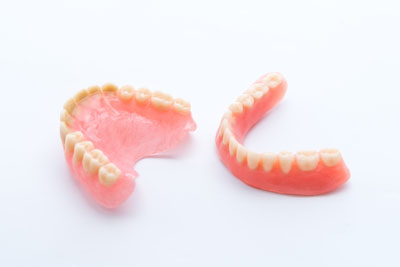 The transition to dentures can be both an exciting and unnerving time in your life. First of all, your lifestyle is going to improve immeasurably: you’ll be able to eat, talk, swallow and smile in a whole new way. Implant patients also report a dramatic rise in their self-esteem and confidence, as their new smiles radiate from well below the surface. With the new and improved technology of dental implants, you can rest assured knowing that your dentures are going to be that much more secure. Implant supported dentures are fixed, meaning they stay in at all times so you can enjoy the food you want and talk without worrying that your dentures will slip.
The transition to dentures can be both an exciting and unnerving time in your life. First of all, your lifestyle is going to improve immeasurably: you’ll be able to eat, talk, swallow and smile in a whole new way. Implant patients also report a dramatic rise in their self-esteem and confidence, as their new smiles radiate from well below the surface. With the new and improved technology of dental implants, you can rest assured knowing that your dentures are going to be that much more secure. Implant supported dentures are fixed, meaning they stay in at all times so you can enjoy the food you want and talk without worrying that your dentures will slip.
Learn about implant supported dentures
Unlike a regular denture, which rests on your gums, implant supported dentures are anchored in your mouth by dental implants. Most often, this form of denture is placed in the lower jaw because dentures tend to be less stable in the lower jaw. However, implant supported dentures can be placed in in the upper jaw as well. In this type of denture, your implant supported denture snaps into place on the implants surgically placed in your jaw. This prevents the denture from slipping or coming loose in the mouth. It also removes the need for denture paste or adhesives. The implant supported denture can be removed at night for cleaning or, if you have a fixed implant supported denture placed, your dentures will act as permanent teeth.
There are two types of implant-supported dentures: bar-retained and ball-retained. In both cases, the denture will be made of an acrylic base that will look like gums. Porcelain or acrylic teeth that look like natural teeth are attached to the base.
Bar-retained dentures – A thin metal bar that follows the curve of your jaw is attached to two to five implants that have been placed in your jawbone. Clips or other types of attachments are fitted to the bar, the denture or both. The denture fits over the bar and is securely clipped into place by the attachments.
Ball-retained dentures (stud-attachment dentures) – Each implant in the jawbone holds a metal attachment that fits into another attachment on the denture. In most cases, the attachments on the implants are ball-shaped ("male" attachments), and they fit into sockets ("female" attachments) on the denture. In some cases, the denture holds the male attachments and the implants hold the female ones.
Implant-supported dentures offer a number of benefits over traditional dentures. Patients with implant-supported dentures can eat, speak, and smile with confidence, knowing that their dentures are securely in place. Further, implant-supported dentures can actually improve a patient’s oral health. After implant-supported dentures are in place, patients should properly care for their teeth and gums. The dentures, gums, and tongue should be brushed twice a day. Patients should also floss daily to remove debris between the teeth; though false teeth won’t become damaged by decay, plaque build-up can still cause gum disease and bad breath. Patients with dentures should also schedule dental visits every six months so their dentists can check the fit of the dentures and look for signs of dental problems.
Related Posts
3 Options for Partial Dentures
There are many options that you can consider when looking at partial dentures. They can come in several different materials and varieties. Let us take a look at each one, taking both …
A Guide to Partial Dentures
A partial denture is a great way to restore not only your smile but also your confidence. This guide will highlight all of the critical aspects of dentures to help you make …
Poor Denture Care Habits to Avoid
Dentures are removable, custom-made replacements for lost teeth. If you want your dentures to last for a long time, it is crucial to take care of them. This will help you to …
A Dentist Explains Why Partial Dentures Might Be Right for You
Partial dentures are often recommended by dentists to replace a single missing tooth or a section of missing teeth. They are a relatively affordable solution that offers unique benefits. This review discusses …
